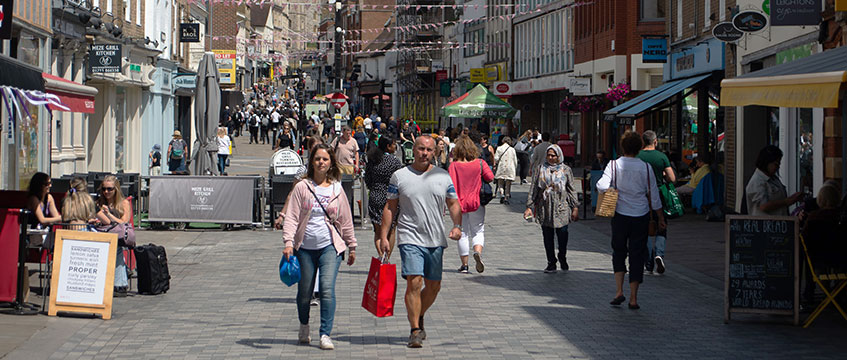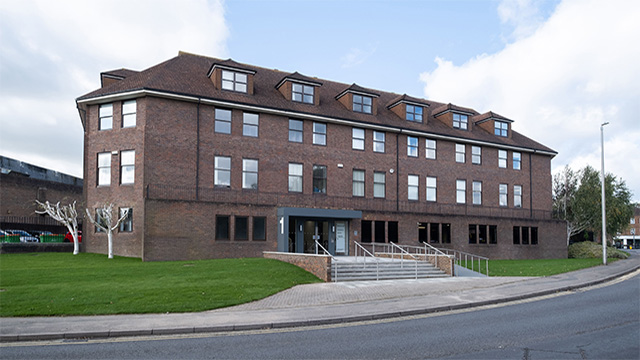How the high street can fulfil the UK’s top three needs
How can we make our high streets more sustainable and more successful? Our experts from across government, regeneration, asset management and hotel development were brimming with ideas.
Mark Robinson, head of regeneration at NewRiver, said it was time to re-frame the debate and look holistically at our town centres and high streets as the only places where we can solve our three most pressing needs.
For Robinson, who chaired the recently concluded government-commissioned High Streets Task Force, these challenges come under E (for environmental), G (for growth) and H (for health) – rather than the more familiar ESG.
How can we make our high streets more sustainable and more successful? Our experts from across government, regeneration, asset management and hotel development were brimming with ideas.
Mark Robinson, head of regeneration at NewRiver, said it was time to re-frame the debate and look holistically at our town centres and high streets as the only places where we can solve our three most pressing needs.
For Robinson, who chaired the recently concluded government-commissioned High Streets Task Force, these challenges come under E (for environmental), G (for growth) and H (for health) – rather than the more familiar ESG.
Town centres and health
To address the environmental crisis, Robinson argued that we must bring people closer to the things they need – in other words, into our town centres. To tackle weak economic growth, we need to invest in those town centres, he said, rather than in concepts such as investment zones and freeports. And the “massive problem” of health inequality must be addressed through our town centres.
“When you go to some of these left-behind towns, the only thing that looks more rundown than the places are the people,” Robinson said. “We can only solve that by looking at our high streets, at our town centres. That’s where the change must happen.”
What people need and what places need to thrive are in fact perfectly aligned, he argued. “You want to be entertained, fed, clothed, educated and you want to be made to feel healthy. These are all the uses we need to bring back into our high streets to make high streets thrive again, so there’s a complete coherence around thriving people and thriving places,” Robinson summed up.
Sleep seems to be another key ingredient for people to thrive. Steve Bennett, chief property and development officer at budget hotel company Travelodge, certainly thinks so and said it was time to “put a rocket under the transformation of real estate on the high street that is either redundant or underutilised”.
Travelodge, which opened its 600th budget hotel earlier this year, is targeting 300 locations. Bennett said those are increasingly in town and city centres, on high streets and even in shopping centres, tapping into demand from customers visiting for concerts and other leisure attractions or to spend time with family.
“One of the key pillars of our sustainable growth is to convert existing space, so we are going to take existing office or retail space primarily in town centres and high streets and convert those into hotels,” he said.
Within those 300 target locations, Travelodge has been identifying those with suitable local authority land and engaging with those local authorities on the benefits it can bring. It seeks to engage “very locally” with communities on its potential impact on the local economy through its customers spending money and time on local businesses, but also through job creation.
Leisure destination
In Rotherham, this has paid off with Travelodge opening at the site of a former supermarket. The local authority was “progressive” and keen to make Rotherham more of a leisure destination, Bennett said.
Anyi Hobson, founder of SEAM Advisory, which focuses on ESG and DEI, said careful thought was needed to make places relevant and accessible. The “more global ramifications or implications of our strategies” must be kept in mind, she said – particularly how they impact on 2050 net-zero goals.
But she stressed the need to take “hyper local” steps at the same time. In Belfast, where she was involved in the asset management of the Victoria Square shopping centre, that mindset led to the replacement of a London-based marketing agency with a local team and bringing on board Belfast-born boxer Carl Frampton – who, importantly, has die-hard fans among both Catholics and Protestants – to perform a public workout, drawing crowds to the centre.
That resonated with local people and brought in “more men than would typically be at a shopping centre,” she recalled. The asset management team also put in the first Changing Places toilet, designed for people with complex disabilities and mobility needs. It was the first in Northern Ireland. “We recognised that people were driving for hours to get there – it was a day out. You really need to think about all the elements beyond the initial thing, which is to get people to spend money at the centre.”
Steve Race, MP for Exeter, agreed that creating new or existing places where people want to spend time had to come first – with the removal of cars from smaller high streets and bigger city centres being one of the keys to that.
Race said that Exeter was “pretty vibrant”, largely because of its student population. But he acknowledged that older members of the community living in the suburbs tended to feel there was nothing for them in the city centre.
Halcyon days?
“Their perspective has changed because the shops they used to use simply aren’t there anymore – such as Debenhams, BHS and House of Fraser,” he said. “The way that they use city centres has changed and, for some people, the golden age has gone. There’s a communication challenge about what city centres and high streets are for.” He said that retaining cultural, as well as retail, attractions was vital to the city’s future and something the local Business Improvement District played a key role in.
Across the panel, there was a shared frustration at common obstacles. Bennett stressed that “not all local authorities are equal”. Travelodge’s plans in an unspecified location have stalled because the city council and county council are “fighting like cats and dogs” over whether they should progress. “A more joined-up approach would be helpful,” he said. He also said that “everything seems slow at the moment”.
Similarly, Robinson said his experience on the task force had highlighted a concerning lack of joined-up thinking between central government departments. “That’s why I think the mission-based approach works, because it does start joining together the different departments.”
In partnership with
Image © Maureen McLean/Shutterstock











